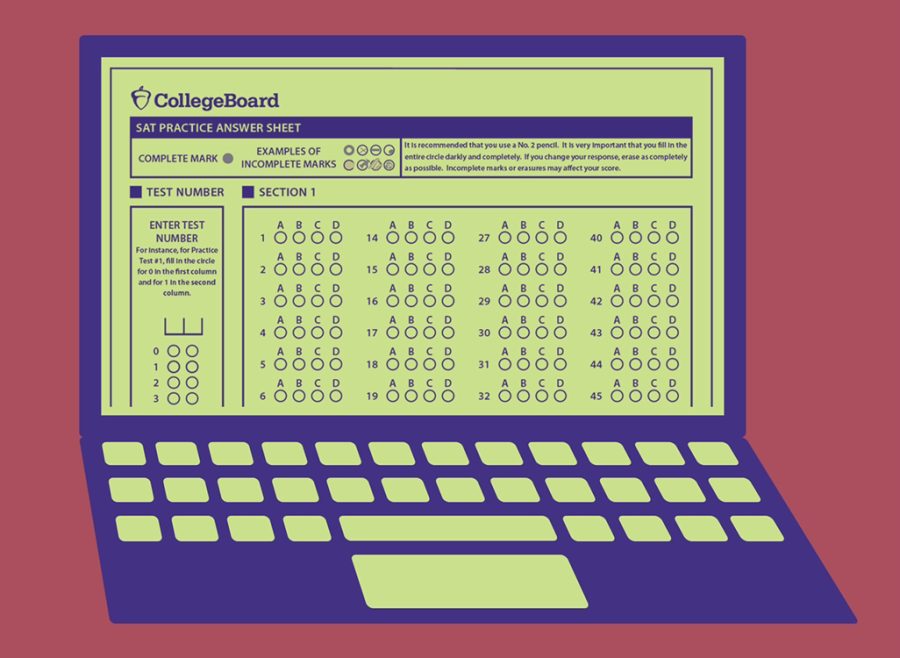The SAT Goes Online: A Step Towards Eradication?
The College Board has stated that in 2024 the SAT will be administered on either a computer or a tablet, in comparison to being on paper.
April 26, 2022
The College Board recently announced two significant changes to the SAT: a shift from paper exams to an online format, and a decrease in the duration of the test, going from a four hour length to only two hours. As a junior in high school who is currently preparing for an SAT in May (on paper), I am distraught. Of course, somehow, I have managed to find my way to taking the SAT on paper two years before the deadline, so you can catch me sharpening my Number 2 pencils before test day.
As a result of the pandemic, SAT scores were optional to submit during the 2021-2022 application cycle, resulting in a decrease in students’ participation in the test from 2.2 million in 2020 to 1.5 million in 2021.
The test being on paper evidently posed challenges for the College Board, as students who usually would take the test in person could no longer do so with strict COVID lockdown enforcement in the spring of 2020. As schools continued their test optional policies even as lockdown rules loosened up, the College Board came to terms with the fact that SATs were no longer as relevant and important to college administrators as they once were. Ultimately, the reality that the SAT was outdated resulted in the transition to an online test platform that makes the test shorter, easier, and more relevant.
Although COVID played a role in the transition to the online exam, when interviewing St Luke’s College Counseling Associate and Registrar Letitia Tregellas, she highlighted that “COVID made it happen faster, but the [SAT] change was definitely going to come at some point.” The transition to an online test also responds to the reality that SAT scores are not good predictors of academic ability. Researchers at the University of Chicago conducted a study that measured the effectiveness of GPAs in predicting academic success in comparison to standardized test scores in order to respond to this assertion.
The study, authored by Elaine M Allensworth and Kallie Ann Clark, posits that GPAs are stronger indicators of a student’s profile because they reach across a wide range of skills and tests in various formats. On the other hand, standardized tests measure narrower topics that do not exemplify an ability to perform well in college.
A combination of COVID precautions and new studies that shine a light on the fact that test scores are not the most effective way to measure academic preparedness, contribute to the SAT going online. By cutting the time limit and making reading passages shorter and calculators accessible for all sections, the SAT has become considerably more accessible and simpler for students of all academic backgrounds. Additionally, the passages the College Board plans to add to the reading sections will include topics that are more likely to be seen in college work, a change that will make the exam more relevant for students entering college.
Despite all of these changes, the question remains: are we one step closer to eliminating the SAT altogether? Unfortunately for all those who prayed they might see the day the SAT is eradicated, when asked about this possibility, Tregellas noted, “They have always said it was going to happen, but I don’t think it will.” Although, she continued and offered a promising recommendation to students taking the SAT in the future: “If [you] are applying to a school that is test optional, [you] shouldn’t sweat it.”
Considering most schools are test optional nowadays, the previously daunting SAT prep courses and hours of studying suddenly don’t seem as imposing. While potentially disappointing to those who have had to suffer through the 8 am start times and stumbled through the painstaking chore of filling in bubbles, the change is exciting for students taking the test after 2024 and marks the beginning of a new era of standardized testing.




Sofia Shklovsky • May 4, 2022 at 2:45 pm
Yes Laura!!!